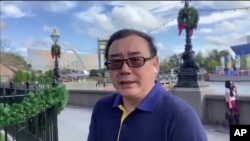Human rights advocates tell VOA that Chinese authorities' mistreatment of detained Chinese Australian writer Yang Hengjun and Chinese citizen journalist Zhang Zhan is part of Beijing's longstanding crackdown on dissent.
"We have known for a long time that the Chinese government ill-treats and tortures people who are in detention," said Sophie Richardson, co-executive director of U.S.-based Chinese Human Rights Defenders.
"The Chinese government's consistent failure to deny people in detention adequate care and protect them from ill-treatment and torture is the norm. The fact that nobody has ever been held accountable, either domestically or internationally, for these abuses is a significant part of what enables [this trend,]" she told VOA by phone.
Yang, a democracy advocate and prominent spy novelist, was tried in a secret trial under espionage charges in 2021 and given a suspended death sentence last February.
Zhang, a former lawyer, was released from prison in May 2024 after serving a four-year sentence for reporting on the COVID-19 outbreak in the Chinese city of Wuhan in early 2020.
She was arrested again in August 2024 after repeatedly calling for the release of Chinese activist Zhang Pancheng.
Yang's family and friends told VOA by phone that the Australian writer, who has been in Chinese detention for six years, has been denied access to food, medical care, and other daily necessities by Chinese authorities since he was transferred from a detention center in June to the Beijing Municipal No. 2 Prison.
"Prison authorities reduced his monthly allowance from 200 yuan [approximately $27.60] to 100 yuan [approximately $13.80] last November, after he could no longer carry out his assigned chores at a factory in prison due to deteriorating eyesight and fatigue caused by a serious flu," said Feng Chongyi, an expert on Chinese politics at the University of Technology Sydney and Yang's former academic adviser.
"He doesn't have enough money to buy food and warm clothes despite his deteriorating health and the sub-zero temperature in Beijing," Feng told VOA by phone, adding that prison authorities repeatedly have denied Yang's request for medical treatment.
Yang said he did not appeal last year's death sentence because of a lack of trust in China's judicial system, and family members urged Chinese authorities to provide "adequate and supervised medical care" for him.
During a monthly consular visit last November, Yang told Australian diplomats that his prison conditions were "harsh and unbearable," and he urged Australian authorities to raise concerns about his situation with Chinese authorities.
"The Australian government, including the Australian Ambassador to China Scott Dewar, has repeatedly expressed concerns about Yang's conditions to the Chinese government, but Beijing hasn't responded favorably to issues raised by Canberra," Feng said, accusing Beijing of "intentionally torturing" his former student.
With no sign of improvement in Yang's condition, the Sydney-based academic urges Australian authorities to prioritize Yang's case and be tougher with their Chinese counterparts.
"The Australian government should prioritize the rights of its citizens when dealing with China, instead of seeking to normalize economic relations with Beijing when its citizens are mistreated in the Chinese prison," Feng told VOA.
Australian authorities repeatedly have raised Yang's case during meetings with their Chinese counterparts. Australian Foreign Minister Penny Wong called last year's imposition of a suspended death sentence "appalling."
"The government advocates for Dr. Yang at every opportunity, at the highest levels, and we will continue to do so," a spokesperson for Wong told Australian media this week, adding that the efforts include advocating for Yang's access to appropriate medical care. Yang Hengjun holds a doctorate.
VOA has contacted the Chinese Foreign Ministry and the Chinese Embassy in Australia for comments but did not receive a response at the time of publication.
Hunger strike
Meanwhile, Chinese citizen journalist Zhang Zhan, who was rearrested for public order offenses in August, reportedly has kicked off a new round of hunger strikes at a detention center in Shanghai.
According to Chinese Human Rights Defenders, prison authorities have force-fed Zhang through a gastric tube to keep her from becoming malnourished, an act that human rights organizations say constitutes "torture" under international human rights conventions.
This marks the second time Zhang has used a hunger strike to protest her detention.
During her four-year prison sentence, which ended in May 2024, Zhang staged a monthslong hunger strike that caused her weight to drop to under 40 kilograms at one point.
Teng Biao, a Chinese legal scholar and human rights lawyer based in the United States, expressed concern about Zhang's conditions in detention.
"Normally, Chinese dissidents will face harsher treatments when they are detained for the second or third time, so I'm worried about Zhang's situation in detention," he told VOA by phone.
In his view, Chinese authorities' mistreatment of Yang and Zhang reflects the escalating crackdown on dissidents in China.
"By intensifying the punishment against dissidents, the Chinese government is trying to create an authoritarian environment in which no one can criticize or challenge the authorities," Teng said.
VOA has contacted the Chinese Foreign Affairs Ministry and Pudong Detention Center for comments. In a previous response to VOA, the Chinese Embassy in Washington said China is "a country ruled by law and liberty is protected and respected" in the country.
Human rights advocate Richardson said that since the detention of dissidents has become a norm in China, democratic countries should consider increasing the price that Beijing must pay for committing human rights violations.
"Democratic governments have to be much more muscular in demanding releases and withholding aspects of the relationship that Beijing wants or finding ways to punish Beijing for refusing to release people, especially when their own citizens' lives are on the line," she told VOA.
Richardson emphasized she thinks democratic nations must regroup and discuss different punitive measures, such as international investigations, to stem systematic and widespread human rights violations in the People's Republic of China.







